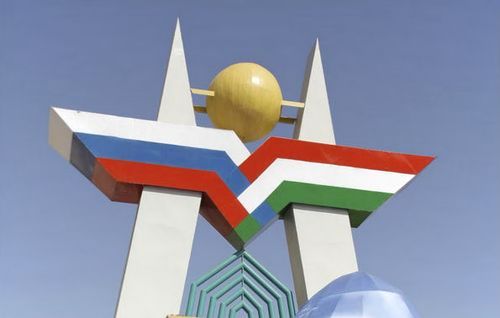
Developments in Ukraine Will Likely Force Tajikistan Closer to Moscow
Publication: Eurasia Daily Monitor Volume: 11 Issue: 57
By:

During a March 8 meeting in Moscow with Russian Foreign Minister Sergei Lavrov, Tajikistani Foreign Minister Sirojiddin Aslov drew comparisons between the EuroMaidan protests and Tajikistan’s bloody civil war (Ozodagon, March 8). The comments closely mirrored those given four days earlier by Igor Lyakin-Frolov, Russia’s ambassador to Tajikistan, indicating that both Tajikistani and Russian officials are reading from the same talking points and presenting a united front (Ozodagon, March 4). On the same day that Arseniy Yatsenyuk was declared Ukraine’s interim prime minister, Tajikistan’s official news agency Khovar published a highly critical article on EuroMaidan, which repeated many of Moscow’s accusations including charges that the Ukrainian protest movement was directed by hidden foreign hands and populated by fascists (Khovar, February 26). Two days earlier, several websites including Ozodi.org, Radio Free Europe’s Tajik-language service, were blocked by the government (TojNews, February 24).
On March 13, Valentina Matviyenko, speaker of Russia’s Upper House, travelled to Dushanbe ostensibly to discuss boiler plate issues of “mutual concern.” However, the timing of the visit was not lost on local officials (https://www.president.tj/node/6346). During the discussions, Mahmadsaid Ubaydulloyev, the mayor of Dushanbe and chairman of Tajikistan’s National Assembly, raised concerns over the increasing pressure on Tajikistani migrants in Russia, noting the troubling trend that, in the first two months of 2014 alone, more than 21,000 workers were banned from entering Russia compared to a total of 15,000 throughout all of 2013 (BBC Tajik, March 12).
During the meeting, Matviyenko presented a plan to Tajikistan’s officials to send 400 Russian-language teachers to Tajikistan to promote the Russian language (Ozodagon, March 13). Since independence, Tajikistan has made promoting the Tajik language a pillar of its attempts to forge a non-Soviet identity and has even gone as far as banning signs printed in Russian and declaring Tajik to be the sole official language of government business. The atrophying Russian language skills of Tajikistan’s citizens is most acutely seen amongst the less educated population of migrant workers employed in Russia whose remittances keep the Central Asian country’s fragile economy afloat. While Matviyenko conspicuously avoided any mention of the crisis in Ukraine, at a press conference she did expressed concern over the security situation in Tajikistan and Afghanistan, calling it a “complex and difficult” region (BBC Tajik, March 13).
Tajikistan’s besieged opposition has reacted differently to Yanukvych’s ouster. On March 1, Muhiddin Kabiri, the head of the Islamic Renaissance Party of Tajikistan (IRPT), while addressing an audience of young people, discussed the situation in Ukraine and its potential ramifications for Central Asia noting that Viktor Yanukovych failed to absorb the lessons learned by other dictators who were deposed by popular uprisings (TojNews, March 3). Several days later, while speaking to party activists, he made the rather provocative statement: “Muammar Gaddafi, the former president of Libya, used to say, ‘Anyone who criticizes me is a mouse who has lived their life in a cellar and I will subdued them in that same cellar.’ However, by God’s will, it was he who was killed in the cellar” (Ozodagon, March 6).
While some local analysts think that Tajikistan is ripe for a similar sort of uprising, others disagree. In an article posted on the IRPT’s official website entitled “Ukraine and ‘Maidan’—a signal to Tajikistan?” Azimjon Vahob, a senior member of the IRPT, argued that 1) Tajikistan lacks the necessary civil society to form an effective protest movement, and 2) he felt that the events in Egypt and Syria indicate that the United States and the West are much more likely to tolerate the violent suppression of popular movements when they occur in Muslim countries (Nahzat, February 27). However, he rejected the idea that the memory of Tajikistan’s civil war was an important factor in preventing people from protesting, noting that this narrative serves the agenda of both Russia and Tajikistan’s President Emomali Rahmon.
The latest round of official statements and meetings between Russian and Tajikistani officials reinforce the lesson Dushanbe learned last year during its protracted negotiations with Moscow over military basing rights: remain a vassal state of Russia or face harsh economic reprisals that would likely have dire domestic consequences. While Rahmon has previously attempted to pursue a multi-vector foreign policy to check Moscow’s influence, Russia has, time and again, been able to assert its primacy.
On February 24, Vladimir Zhirinovsky, the head of Russia’s extreme nationalist Liberal Democratic Party, suggested the creation of a “Central Asian Federal Region” that would incorporate all five of the former Soviet Central Asian Republics (see EDM, February 27). Normally this suggestion would be written off as the inflammatory rhetoric of a controversial politician. However, given recent events, Central Asian leaders might be wondering if Zhirinovsky’s unfiltered rants in fact express widely held sentiment that others in Russia’s foreign policy establishment are merely too sober and calculating to articulate.
Leaders across the region are currently pondering the ramifications of Yanukvych’s downfall, the annexation of Crimea, and their own relationships with Russia. But Emomali Rahmon has already seen the writing on the wall. As long as Russia hosts 7,000 troops on its soil and controls the flow of migrant labor, Tajikistan will remain in a de facto state of quasi-annexation.




